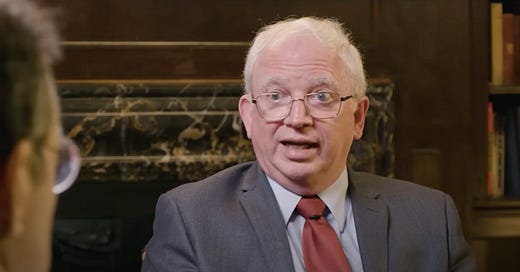
John Eastman: The Dems Made Me Do It
Author of the “coup memos” says 2020’s “existential” stakes justified extreme action.
FOR NEARLY TWO YEARS NOW, since he was revealed in September 2021 to be the author of the notorious “coup memos,” John Eastman has been walking a bizarre legal and political tightrope.
On the one hand, we have the man who filed a legal claim on behalf of President Donald Trump in Texas in December 2020 seeking to invalidate millions of votes. The man who was invited to join Trump’s unofficial legal team later that month, where he wrote the two elaborate memos delineating various paths that Trump and Vice President Mike Pence could take to delay or overturn the election count. Who tried in person to persuade Pence that, at the very least, he had the authority to delay the vote count; who spoke at Trump’s “Save America” rally on January 6th, repeating conspiratorial lies about election fraud; whose emails that same day reveal that during the siege of the Capitol that he blamed Pence for not acting as he had advised; who was caught on video (by an undercover activist) boasting about working to overturn the election; who lost his academic appointments in the aftermath of these events; whom a federal judge concluded had “more likely than not” broken the law; who may soon be disbarred in the state of California; and who is so worried about being indicted by Special Counsel Jack Smith that he has requested a postponement of those disbarment proceedings.
On the other hand we have a man who has tried to distance himself from his own memos, at one point calling himself “the white knight here, talking [Trump] down from the more aggressive position” in advance of January 6th. This other Eastman has consistently maintained that his recommendations to Pence and Trump were narrow, sensible, and moderate. That he had merely recommended “hitting pause” on the vote count on January 6th, so that the relevant election controversies could be adjudicated by the states. That to follow the other paths articulated in his memos would have been reckless.
The gulf between these two Eastmans—the eager-to-act conspiratorial Eastman and the reticent lawyerly one—shrunk a bit last week, with the release of the third and final installment of an Eastman interview with the Claremont Institute’s main financial backer, chairman of the board, and gonzo anti-woke warrior, Thomas D. Klingenstein. In this interview, Eastman comes close to saying that his own electoral shenanigans and legal wrangling have been a sideshow. In sentiments reminiscent of Michael Anton’s “The Flight 93 Election” essay and subsequent writing, Eastman makes it clear—without fully dropping his lawyerly persona—that for him, the deeper reason for standing by Trump through his January 6th saga was that he thinks Democrats are destroying the country.
LAST WEEK, I WROTE about the first and second parts of Eastman’s interview with Klingenstein. In the first, they trot through a long list of disproven allegations of 2020 election fraud. The second is about January 6th and the question of Pence’s legal authority to delay or overturn the election.
Now comes the concluding installment, which begins by focusing on the question of prudence: Given all the complex considerations involved in the 2020 election, was it prudent for Eastman and Trump to pursue the course of action that they did?
The interview is full of odd claims and intriguing revelations. For example, at one point Eastman says that in his considerations of prudence he did not take into account the possibility of mob violence, because he was working in “a different department,” that “Trump himself had authorized the call-up of 20,000 members of the National Guard for January 6th” (not true), and that Eastman just assumed that “those things were handled.”
Eastman also suggests in this segment that he believed there was a “fair prospect” that he would have been able to win “a majority of the [Supreme] Court” in support of Pence’s right “merely to delay,” or at least to get the Court not to touch the issue as nonjusticiable.
But the interview really gets disturbing in its last ten or so minutes, when it turns to the question of Eastman’s deepest motives. Why was it so important to Eastman to see Trump re-elected? Klingenstein suggests that the “biggest” factor motivating Eastman “is the current circumstances in the country, the political and social condition.”
Eastman agrees. After some discussion about how the legal situation surrounding the 2020 election was different from the legal situation in two other close elections, those of 1960 and 2000, Eastman makes clear that the more important distinction he sees among those three elections is that “the stakes” in 2020 were higher—that they were literally life or death:
Certainly not in 1960, but also not in 2000, were the stakes about the very existential threat that the country is under as great as they are.
We’re not talking about, you know, handing over to John Kennedy, instead of Richard Nixon, who’s gonna deal with the Cold War. We’re talking about whether we are going to, as a nation, completely repudiate every one of our founding principles, which is what the modern left wing which is in control of the Democrat party believes—that we are the root of all evil in the world and we have to be eradicated.
This is an existential threat to the very survivability, not just of our nation, but of the example that our nation, properly understood, provides to the world. That’s the stakes.
Obviously, when the stakes are this high, you do whatever you can to fight back. As Anton put it about the 2016 election, you “charge the cockpit or you die.” So when the opportunity came along to be part of a challenge to the normal election processes, Eastman was eager to join the fight.
The interview does not, it seems to me, involve a moment where Eastman fully “comes clean” about trying to overthrow a legitimate election (as Josh Marshall has suggested). Rather, what Eastman does is zoom in and out between what we might call the deeper cause of his actions—his belief, entirely consonant with Anton’s original “Flight 93 Election” bullshit, that liberals and the left pose an existential threat to the country and are traitors to the country’s founding principles—and the immediate rationale or pretext for his behavior, which is the premise of the stolen election.
In the very next part of the interview, Eastman zooms out:
Trump seems to understand that [i.e., the stakes] in a way a lot of Republican establishment types in Washington don’t, and it’s a reason he gets so much support in the hinterland and the ‘flyover country.’ People are fed up with folks, you know, get-along-go-along while the country is being destroyed.
And then Eastman zooms back in to argue that these high stakes justified his involvement in Trump’s post-election machinations:
And so I think the stakes are much bigger, and that means a stolen election that thwarts the will of the people trying to correct course, and get back on a path that understands the significance and the nobility of America and the American experiment is really at stake and we ought to fight for it.
Eastman and Klingenstein seem almost to suggest that stolen elections are a dime a dozen in American history, but only in this instance was it worth the fight.
At this point in the interview, Eastman all but drops the façade, and zooms out all the way. When asked by Klingenstein once again whether he maybe would have made a different prudential calculation in 1960 or 2020, Eastman says yes, “I may have come to a different conclusion.” Then he proceeds to explain:
Look, our founders lay this case out. The prudential judgment they make in the Declaration of Independence is the same one. There’s actually a provision in the Declaration of Independence that says, you know, a people will suffer abuses while they remain sufferable—or tolerable, while they remain tolerable—but at some point the abuses have become so intolerable that it is not only their right but their duty to alter or abolish the existing government.
So that’s the question. Have the abuses and the threat of abuses become so intolerable that we have to be willing to push back.
This is an extraordinary thing to admit. For one thing, by the time you’re appealing to the Declaration of Independence in that way you are in effect admitting that you were trying to overthrow your government.
It may be obvious but it’s worth saying this out loud: Violence is implicit in this line of argument. Lincoln understood this when he spoke of Americans’ “revolutionary right to dismember or overthrow” their own government. The men and women who charged the Capitol understood this. Eastman and Klingenstein, sitting in their suits and ties in an elegant study lined with books, may deny having violent intentions, may even abjure the use of force, but implicit in their rhetoric in this interview and elsewhere (Klingenstein’s website: “The essential thing is for Republicans to understand we are in a war and then act accordingly”) is a justification for violence.
AS THE INTERVIEW CONCLUDES, Eastman goes on to maintain, again, that supposed Democratic election-stealing played a part in his prudential calculation. But he says plainly enough throughout that the more fundamental motive concerned the basic state of the country and his political and philosophical disagreements with Democrats. A few minutes after his appeal to the Declaration, Eastman will claim that Democratic efforts to destroy the country have accelerated rapidly—“it’s been an exponential increase in the last few years”—and as an example he quotes the culture wars: “You’re gonna let 50-year-old-men naked into teenage girls’ showers at public pools, or drag queens doing story hours to 6-year-olds.”
Of course. The trans people and drag queens left Eastman no choice. The Democrats made him do it.
The Klingenstein-Eastman interview is, in the main, situated squarely in the muck of conspiracy theories about the 2020 election and obtuse speculative reasoning about the vice president’s proper role in the congressional counting of Electoral College votes. In this third installment, however, as Eastman goes on about Democratic bogeymen and the higher “stakes” of the 2020 election, it becomes quite clear that, at some point, for these men and in this fight, anything goes. Pretexts and premises be damned.
Given the overall sham quality of Eastman and Trump’s political and legal arguments to date, it seems quite likely that they both reached that point a long time ago. At this point the two men have gone all in. Nothing’s going to stop them now.
Except, maybe, in Eastman’s case at least, the American courts and rule of law.

















